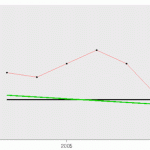climate change
tags: environment, forest ecology, trees, forestry, carbon sequestration, global warming, climate change, Nature Conservancy, streaming video
You know that trees store carbon, but what does that really mean? How much carbon does the tree outside your window store, and how does that compare to the carbon we emit when we travel or power our homes?
How many trees are in your yard? I don;t have a yard (I have a fire escape), but my neighborhood is being revitalized by BYC's "Million Trees" project, so roughly by the time that I leave for Germany, the city will be planting trees on the street in…
The costs of doing something about climate change are the subject of much debate these, and Canada is no exception. The federal government, like the ones before it, has shown little interest in honest analysis, so one of the country's biggest banks, TD Bank, decided to pay for a study all on its own. The results, which the bank's economists call "robust," represent perhaps the most comprehensive effort to nail down those costs, at least for one country. And what did the consultants they hired to write the report find? Good news, actually.
Unless, of course, you happen to own a piece of the…
By now, I'd expect the authors of Superfreakonomics are having mixed feelings about their new book. On the one hand, they're making good money as the book enjoys healthy sales. On the other, just about every actual expert in the field to which Chapter 5 is devoted -- climate change -- has savaged their take on the subject.
This week comes perhaps the most devastating criticism, from four statisticians whose analysis of global temperature trends demonstrates just how wrong Steven D. Levitt and Stephen J. Dubner got the numbers. And an AP story on the statisticians' analysis raises some serious…
For those who really grok the precautionary principle, aiming for a lower, and therefore inherently safer, maximum atmospheric carbon-dioxide concentration is the logical choice. Civilization arose over the last 10,000 years in a world in which CO2 represented just 280 of every million atoms we and every other respiring organism inhaled. Given the uncertainty over what level of the trace gas leads to dramatic changes in the climate -- we know there's a relationship but haven't been able to nail down the tipping point -- the closer to pre-industrial levels the better.
But there's a problem.…
Another depressing poll result from one of the more reputable sources:
The latest national survey by the Pew Research Center for the People & the Press, conducted Sept. 30-Oct. 4 among 1,500 adults reached on cell phones [excellent!] and landlines, finds that 57% think there is solid evidence that the average temperature on earth has been getting warmer over the past few decades. In April 2008, 71% said there was solid evidence of rising global temperatures.
Why the drop?
According to the experts that appear in the Guardian's story, it's the economy and corporate propaganda:
Michael…
Not being a regular, or even occasional, listener of Rush Limbaugh, I have no idea if this week's obscene call for New York Times climate reporter Andy Revkin to commit suicide was simply par for the course. We all know that Limbaugh is an entertainer who is just doing what he needs to do to attract attention, maintain audiences and retain advertiser support. It's a free country (for most of us). But I'm a journalist and I cover climate change, too. So this hits too close to home to ignore.
On Tuesday, Limbaugh's radio show included this line: "Mr. Revkin, why don't you just go kill yourself…
In which your humble blogger makes a desperate attempt to write something original about the latest affront to reasonable discourse in the global warming crisis.
There's little point in duplicating the devastating criticism that has been leveled at Superfreakonomics, the sequel to the wildly popular book, Freakonomics, by Steven D. Levitt and Stephen J. Dubner. I will point to just two examples: Gavin Schmidt's take-down at Real Climate, and Joe Romm's series at Climate Progress. But there are plenty more.
Even NPR couldn't run an interview with one of the authors without including a…
Some group of bloggers has decided that today, Oct. 15, 2009, is "Blog Action Day." And this year's theme is climate change. Excellent, Smithers.
My instincts are to ignore such declarations. It's always an International Year of This or National X Awareness Month, or World Y Day. Community newspapers take advantage of free copy and extra revenue by organizing special advertising supplements around them. I've always thought that they interfere with genuine news values by wasting space and resources on what are more or less abritrary pet-project campaigns.
But I've been planning on writing a…
Most observers of climate change media coverage long ago stopped wringing their hands every time Fox News reported that global warming has stopped and that humans are responsible anyway, mostly to avoid calluses. A while back it seemed like Fox might be ready to embrace the actual science, but old habits die hard. For example, Fox took a Sky News story back in August that suggested we may be on the verge of returning to record warm years and gave it the headline of "Natural Factors Could Cause Global Warming."
Yes, the story was about solar activity, but here's the nub of the science that was…
Peter Sinclair is remixing some of his Climate Crock of the Week videos to improve the sound quality.
I would like to use this Mars Attacks! episode as an opportunity to close the Mars is Warming too thread.
Watch and learn:
Let's just make one thing clear: I believe anthropogenic climate change constitutes the most serious public policy challenge of our time, second only in the history of civilization to global thermonuclear warfare. It's hard to overstate the danger of business as usual when it comes to our fossil-fuel emissions. If, as a growing number of climatologists believe, we are headed for a world that is 4 °C warmer than pre-industrial norms by the latter half of this century, then averting that scenario should be at the top of everyone's priority list.
Still, it is still possible to exaggerate the…
Yet another faux fraud in the climate wars with the same liars and hypocrites piping in.
Real Climate has a nice display of all the hockey sticks out there, and Denial Depot has the most compelling attack.
Deltoid gives us a great run down of the kerfuffle.
Well, I play Air hockey, Ball hockey, Barn Hockey, Bubble Hockey, Field hockey, Floor hockey, Ice hockey, Kitchen hockey, Road hockey, Roller hockey, Table hockey, Twist hockey
And I play hockey, hockey, hockey, hockey, hockey, hockey, hockey, hockey, hockey, hockey, hockey, hockey, hockey, hockey, hockey all the time!
Take shots!
-- Jughead
Take shots, indeed. Steve McIntyre is at it again, Tim "Deltoid" Lambert has the goods, and Gavin at Real Climate has an even more snarky response. But if you're too lazy to read the whole torrid thing, I'll summarize, because I'm pretty good at it, if I…
With all due respect to the recipients of this year's Nobel prizes -- telomeres are more than worthy of our attention -- it's time for an overhaul of the whole thing.
Complaints about the outdated categories that ignore an enormous range of scientific endeavors appear each year at this time, and it's unlikely that the latest barrage of criticism will result in any real change. Still, there are plenty of good argument in favor of reform. Here's one.
New Scientist asked a group of notable scientists and authors for their thoughts on the subject. They came up with a letter pointing out the…
This job ad from Katherine Hayhoe, amazing climate scientist and one of my favorite Twitter people, is EXACTLY the sort of career opportunity that we need to see more of.
The realities of our world are that many of us need or wish we had
more flexible jobs - in terms of hours, location, and what we can do
with kids underfoot. With that in mind, about 10 years ago I started a
research consulting company that I hoped would create that ideal job
for me. Today, atmosresearch.com provides occasional to full-time work
to more than a dozen people, over half of us women.
Given our focus on providing…
It's not a home run by any stretch of the imagination, but the Senate's counterpart to the Waxman-Markey climate change bill (a.k.a. ACES) that the House narrowly passed earlier this year at least gets global warming onto first base. There's bad and good in the awkwardly titled Clean Energy Jobs and American Power Act, of course, and it still won't get us anywhere the kind of greehouse gas emissions levels than even the conservative climatologists say are necessary. The differences between the bills are worth exploring.
The sections that most pique my curiosity are devoted to emissions…
The arguments against carbon capture and sequestration are legion and the list of reasons not to invest more resources in the technology just keeps getting longer. Here's a new analysis from Canadian journalist Graham Thomson. Some of his figures-- on global carbon emissions, for example -- are less than accurate, and this isn't peer-reviewed science, just a journalist's compendium commissioned by the Munk Centre for International Studies University of Toronto. But even allowing for that, Thompson manages to hit the proverbial nail on the head:
The very promise of CCS, whether delivered or…
U.S. Energy Secretary Stephen Chu is all about saving the coal industry. In the latest issue of Science, which includes a feature series on carbon capture and sequestration, he writes optimistically about the challenges and opportunities such technologies pose and why it could save us all from catastrophic climate change.
At least, that's what I take away from his short essay. I don't doubt Chu's sincerity, or his ability to synthesize data. He is, after all, a holder of Nobel Prize for physics. But I'm afraid he hasn't got a good grip on the economics of the matter.
In his essay, Chu writes…
A few weeks ago the nightly hour-long documentary series on CBC Radio, "Ideas," allowed Canadian climate change pseudoskeptic Larry Solomon an entire hour to make his case against the science of anthropogenic global warming. The producers offered not a single challenge to any of Solomon's arguments, despite the fact that practically every point he made on the science of the subject was either false or grossly misrepresented the science.
Solomon is a "respected" enviromentalist. But he has decided climate change isn't as big a threat as just about the entire climatology community fears it to…
The journal Nature has just published a massive feature series on, to use a well-worn phrase, "the limits to growth." The centerpiece is a graphic created by Johan Rockström of the Stockholm Resilience Centre and his colleagues as part of "a new approach to defining biophysical preconditions for human development. For the first time, we are trying to quantify the safe limits outside of which the Earth system cannot continue to function in a stable, Holocene-like state." Here's their wheel of misfortune:
The green is the safe limit, the red represents more or less where we are. For those…


